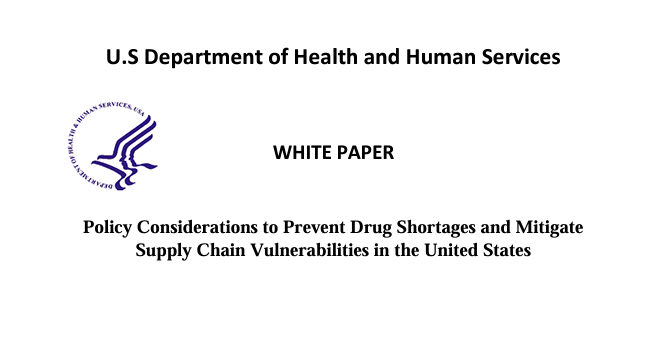In a move aimed at addressing persistent drug shortages and enhancing supply chain resilience, the White House recently unveiled an 18-page white paper proposing a novel strategy. This strategy suggests incentivizing hospitals with Medicare payments to prioritize drug supplies with more resilient supply chains, even if it means hospitals might have to pay more for medicines currently in shortage. The proposal has ignited a debate within the healthcare sector, particularly concerning its implementation and potential impact on hospital procurement practices.
Central to the white paper are two policy considerations, projected to cost between $3.26 billion and $5.11 billion over the next decade. These policies are designed to improve the availability of generic sterile injectable medicines—vital for inpatient care—by allowing drug manufacturers to charge hospitals higher prices for medicines that demonstrate a more resilient supply chain.
- The Department of Health and Human Services (HHS) is tasked with developing the metrics to measure the resilience of these supply chains, a critical step in operationalizing the proposal.
The proposed strategy has sparked concerns among stakeholders about the implications of shifting the financial and operational burden of drug shortages onto hospitals, traditionally the customers in the pharmaceutical supply chain.
- Critics argue that the responsibility for mitigating drug shortages should lie with the entities directly involved in the production, transportation, and regulation of drugs, including manufacturers and regulatory bodies like the FDA. This perspective emphasizes the need for a collaborative approach to building a resilient supply chain, focusing on supporting the roles of key stakeholders in the pharmaceutical ecosystem.
Despite the controversy, the initiative to explore policies aimed at reinforcing supply chain resilience for critical medications is recognized as a commendable effort by HHS. The proposal comes in response to the enduring challenge of drug shortages in the U.S., affecting a broad spectrum of medications, including chemotherapies, ADHD drugs, and sterile injectables. With 123 drugs reported in shortage as of January, the urgency for innovative solutions to this complex issue is more apparent than ever.
The discussion surrounding the Biden administration’s proposal underscores the intricate balance between policy, healthcare delivery, and market dynamics. It highlights the necessity for a multi-stakeholder approach to devising effective and equitable solutions to the persistent problem of drug shortages, emphasizing collaboration over compulsion in the quest for a more resilient pharmaceutical supply chain.
Tomorrow, We’ll Cover What Our Analysis Found

Leave a Reply